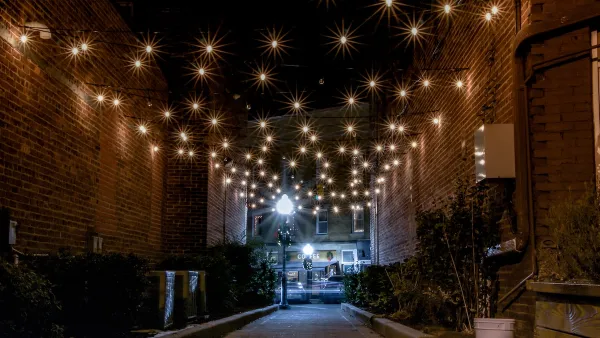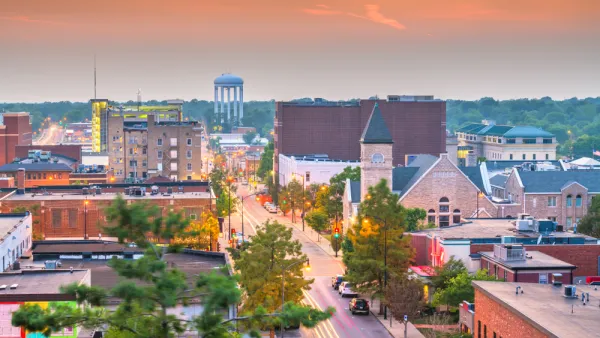Planetizen readers, I have an idea I'd like your opinion on. As managing editor for the past year, I've become increasingly aware of how skilled and professional our readers are. Comments on articles are almost always civil, engaging and thoughtful, something that can't be said for the majority of websites. We have a community of experts here, which is why I bring my idea to you.
Planetizen readers, I have an idea I'd like your opinion on. As managing editor for the past year, I've become increasingly aware of how skilled and professional our readers are. Comments on articles are almost always civil, engaging and thoughtful, something that can't be said for the majority of websites. We have a community of experts here, which is why I bring my idea to you.
The gist is: The Telecommuting Town.
SUMMARY: The promise of the telecommuting future- where workers could work from home, creating a zero commute and allowing people to live where they like- has failed to completely germinate. On the one hand, certain job sectors have moved to a 'gig' economy, where individuals can run small businesses from home and in practice work for a number of employers part-time. On the other, larger businesses have come to distrust the concept of telecommuting as a few bad apples have exploited the practice. The lack of face-to-face contact also poses a challenge, as employers and co-workers miss the direct connection and sense of community that comes from sharing an office.
Meanwhile, a movement is afoot to revitalize Main Streets around the country. Small towns from Waterbury, Connecticut to Baker City, Oregon have worked to restore their main streets through smart growth and economic development strategies. Many of these small towns have the type of well-preserved infrastructure that Smart Growth advocates are promoting. And 30% of people surveyed by the Pew Center indicated that they would like to live in a small town. Lack of access to jobs is the greatest impediment to restoring these small towns.
This project proposes to create a blueprint for the Telecommuting Town, a new community for the future building on the past. Using GIS and demographic surveys, we'll select the Top 20 Towns ripe for creating a telecommuting hub. We'll survey telecommuters around the country to understand their needs. We'll work with economic development experts to explore tax incentives and small business loan programs to attract entrepreneurs and telecommuting workers.
Possible outcomes of the project might be proposals for retrofitting city halls and town centers with wifi, videoconferencing, and meeting rooms to be paid for through small business taxes. Other options might be pairing up with local business owners to create new public spaces that meet the needs of telecommuters and create new customer bases for local cafes, printers, etc. Telecommuting towns might also find that convenient connections to airports or train hubs are important, and create transit shuttles or systems to meet those needs.
So Planetizen readers; what is your expert opinion? Impractical? Missing an element? Voice your opinion below.

National Parks Layoffs Will Cause Communities to Lose Billions
Thousands of essential park workers were laid off this week, just before the busy spring break season.

Retro-silient?: America’s First “Eco-burb,” The Woodlands Turns 50
A master-planned community north of Houston offers lessons on green infrastructure and resilient design, but falls short of its founder’s lofty affordability and walkability goals.

Delivering for America Plan Will Downgrade Mail Service in at Least 49.5 Percent of Zip Codes
Republican and Democrat lawmakers criticize the plan for its disproportionate negative impact on rural communities.

Test News Post 1
This is a summary

Test News Headline 46
Test for the image on the front page.

Balancing Bombs and Butterflies: How the National Guard Protects a Rare Species
The National Guard at Fort Indiantown Gap uses GIS technology and land management strategies to balance military training with conservation efforts, ensuring the survival of the rare eastern regal fritillary butterfly.
Urban Design for Planners 1: Software Tools
This six-course series explores essential urban design concepts using open source software and equips planners with the tools they need to participate fully in the urban design process.
Planning for Universal Design
Learn the tools for implementing Universal Design in planning regulations.
EMC Planning Group, Inc.
Planetizen
Planetizen
Mpact (formerly Rail~Volution)
Great Falls Development Authority, Inc.
HUDs Office of Policy Development and Research
NYU Wagner Graduate School of Public Service






























